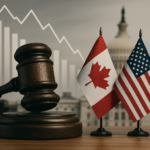Amid the recent escalation of trade tariffs between major powers, global investors are finding themselves in a bind. The so-called “tariff turbulence” – a term already repeated in economic portals – reflects a scenario where protectionist policies disrupt international trade and erode market predictability.
The immediate reactions are predictable: capital flees risky assets, seeks refuge in so-called “safe” bonds, and markets wobble with widespread insecurity. But there is something deeper at play – something that classical liberals and Austrian economists have been warning about for decades.
Interventionism generates distortions
Tariffs are essentially taxes in disguise. By restricting free trade, they interfere with the spontaneous process of market coordination. As Ludwig von Mises pointed out, “protectionism does not protect the economy—it protects inefficiencies.” The result is a business environment that is hostile to the rational allocation of resources.
Aimless investors are symptoms of the problem, not causes
The collapse of investor confidence in the face of unpredictable government measures is a natural reflection of a system that has lost its spontaneous regulatory mechanisms. When the government decides who wins and who loses through tariffs, subsidies or sanctions, prices stop reflecting real market information – and start reflecting political decisions.
Insecurity as a logical consequence
If there is no clear horizon, there is no solid investment. And, ironically, the more the government tries to “protect” the economy with tariff interventions, the more it undermines the basis of any sustainable growth: the freedom to undertake, exchange, invest and innovate.
The way out? Less State, more market
In a world of artificial uncertainty created by governments, the solution is not to double down on dirigisme, but to restore the principles of economic freedom. The Austrian School reminds us that free markets do not guarantee perfect stability, but they do prevent manufactured instability.





